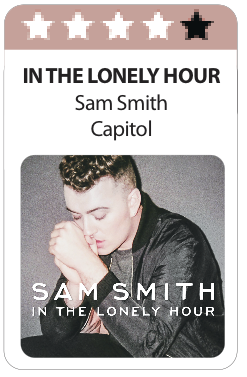Soulful Brit singer answers the question: What if Adele became Aaron Neville?
 ARNOLD WAYNE JONES | Executive Editor
ARNOLD WAYNE JONES | Executive Editor
How’s this for creative viral marketing: Release an album, and just as you do, leak a YouTube video of you singing a cover of a Whitney Houston song. Then don’t include that song on the album.
Watch the resulting frenzy.
That’s what it’s been like for 22-year-old singer-songwriter Sam Smith, whose debut album, In the Lonely Hour, dropped just as a moody, down-tempo version of “How Will I Know” turned the pudgy Brit into an Internet sensation. But for music fans familiar with a few singles he’s released since 2012, it came as no surprise that he could shame Whit: The boy has pipes. (Witness his recent appearance on The Late Show that left the usually unflappable David Letterman gobsmacked and speechless.)
Smith’s paradoxical sounds — a throaty falsetto, if that makes sense, the kind Aaron Neville has perfected — grabs your eardrums like a lariat ropin’ a steer at the rodeo. It’s ethereal and as piercing as frostbite. Emotionally, he’s in touch with his wounded soul (his album was inspired by a romantic devastation of unrequited love for another man. That man’s probably kicking himself about now.)
In the Lonely Hour is a personal album that mixes driving disco beats with lush orchestrations, all anchored by the powerful vocal prowess Smith displays. There’s no clutter to his voice, despite the vocal runs. He’s controlled and precise, and each song has a character that unites even the disparate styles.
The dominant genre, if you want to label it, is pop R&B and blue-eyed soul. It’s old-school, but not for oldsters.
Smith’s mouth enrobes the microphone, so each breath feels like a gasp, each ache a whisper shared by just you and him. It’s an old torch-singer trick — Billie Holliday was the best at it, but check out Norah Jones, Chet Baker and many others for examples — that fuses intimacy with universality.
 There’s a lot of pain here. “Good Thing,” which most obviously captures the pain of rejection, is the early stand-out. For a moment I believed you loved me too /But life is never like that and you were never strong / so much of a good thing won’t be good for long Smith intones, resigned but still wounded.
There’s a lot of pain here. “Good Thing,” which most obviously captures the pain of rejection, is the early stand-out. For a moment I believed you loved me too /But life is never like that and you were never strong / so much of a good thing won’t be good for long Smith intones, resigned but still wounded.
Here and elsewhere, many of the riffs conjure a hodgepodge of other artists — Neville as noted already, but also Sylvester (on the disc opener “Money on My Mind,” which snares you with the hypnotic refrain I do it for the love) as well as Adele (an early-20s Brit wailing about love? Come on!), Amy Winehouse and even ‘80s-era arena rock (the gospel-tinged chorus on “Stay with Me” made me think of Foreigner circa Agent Provocateur, but held closer to the vest).
Not all the tracks pack the same punch. “Like I Can,” on which he whines He’ll never love you like I can can can, is a familiar sentiment without a great musical hook, but “Life Support,” which is mixed with a complex syncopated backbeat while Smith’s voice scales the upper ethers of countertenor and trawls the trench of baritone, keeps you guessing from bar to bar. The breathy anticipation of “Lay Me Down” could be inserted into a love scene in any good stage musical and win its singer a Tony Award.
The official disc boasts 10 tracks, but the deluxe edition includes an astonishing five more songs. The best of the extras is probably the acoustic mix of “Latch,” but “Reminds Me of You” gets your head bopping on the rhythmic chorus and he also features on a song led by Naughty Boy also included here.
Smith isn’t playing it safe in any way, making a debut with collaborations, extras and out gay messages. It’s as if he can’t contain himself, destined to infect us with his special misery. I, for one, am now proudly a carrier.
This article appeared in the Dallas Voice print edition June 27, 2014.

